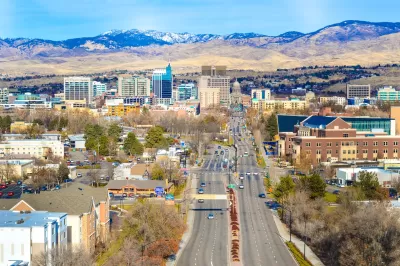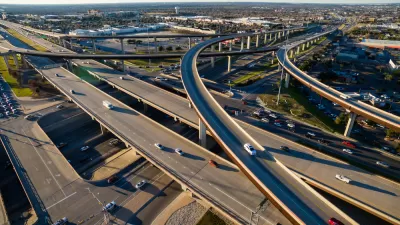On the heels of his stint as Atlanta’s planning director, Tim Keane says Boise should avoid following in the path of American cities that have let highway expansion and sprawl go unchecked for decades.

George Prentice interviews Tim Keane, the new director of Planning and Development Services for the City of Boise, for Boise State Public Radio. When it comes to land use and transportation planning, Keane says planners must “Let go of those flawed ideas that shaped cities for the last generation. Just let them go.”
Pouring money and resources into “dysfunctional highways,” says Keane, doesn’t work. “I can say with great confidence, since I just came from Atlanta, which has the most beautifully designed interchanges you've ever seen that are choked in traffic, that a concentration on designing the most dysfunctional highway that you can is time that's misplaced, because it hasn't worked in any city anywhere in the world.”
When asked about his decision to move from Atlanta to Boise, Keane tells Prentice, “If you look at American cities in the way they've grown over the past 50 or 60 years, the pattern is very similar. The scale is different. But in Boise, the question that intrigues me is, ‘Can we in Boise address these very challenging issues in ways that are better than any American city?’”
According to Keane, “This is a city where we should be concentrating on designing it such that many, many more people can drive less.” Keane goes on, “The only way to do that, however, is if you build beautiful streets that are vibrant and safe for people.” Keane wants Boise to avoid mistakes made by other cities, saying, “let's take up a new collection of ideas around how we address this differently, such that we're building a city that is in the spirit of what the city is today versus becoming something that's utterly different and much like every other city in America.”
FULL STORY: Boise’s new planning director: ‘Let go of flawed ideas that shaped cities for the last generation’

Maui's Vacation Rental Debate Turns Ugly
Verbal attacks, misinformation campaigns and fistfights plague a high-stakes debate to convert thousands of vacation rentals into long-term housing.

Planetizen Federal Action Tracker
A weekly monitor of how Trump’s orders and actions are impacting planners and planning in America.

Chicago’s Ghost Rails
Just beneath the surface of the modern city lie the remnants of its expansive early 20th-century streetcar system.

Bend, Oregon Zoning Reforms Prioritize Small-Scale Housing
The city altered its zoning code to allow multi-family housing and eliminated parking mandates citywide.

Amtrak Cutting Jobs, Funding to High-Speed Rail
The agency plans to cut 10 percent of its workforce and has confirmed it will not fund new high-speed rail projects.

LA Denies Basic Services to Unhoused Residents
The city has repeatedly failed to respond to requests for trash pickup at encampment sites, and eliminated a program that provided mobile showers and toilets.
Urban Design for Planners 1: Software Tools
This six-course series explores essential urban design concepts using open source software and equips planners with the tools they need to participate fully in the urban design process.
Planning for Universal Design
Learn the tools for implementing Universal Design in planning regulations.
planning NEXT
Appalachian Highlands Housing Partners
Mpact (founded as Rail~Volution)
City of Camden Redevelopment Agency
City of Astoria
City of Portland
City of Laramie





























